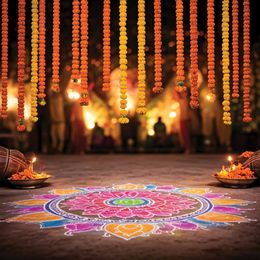With the beginning of a new year, as the days stretch a little longer and the evenings soften into stillness, I find myself waiting for that quiet moment—when the first diya of Navratri is lit in my home. It is a simple act, on the first day of Chaitra, yet it holds divine significance.
This year, as I bowed before the Goddess on the first night of Navratri, I was drawn not only to the beauty of the ritual, but to its quiet, transformative power. Nine nights—nine forms of Shakti. Nine invitations to remember that true strength is found in grace, forged through endurance, and fulfilled in fearless service.
Growing up, I watched my mother observe Navratri fasts with quiet devotion. Her daily rhythm remained unchanged—meetings, parliamentary debates, public responsibilities. Only later would I realise she had not eaten all day. For her, spirituality was not an escape from duty—it was a deep alignment with it. Her faith did not draw her away from the world. It anchored her more deeply within it.
Now, as I carry forward these traditions, I often think of the crores of Indian women who embody the same quiet strength. The woman in Rajasthan who walks miles to fetch water. The mother in Delhi who lights a diya after a day’s work. The self-help group worker in Assam who turns devotion into dignity through her craft. They are all forms of Shakti—quiet, unshakeable and endlessly giving.
One of the most heartwarming rituals of Navratri is the Kanjak Pooja, when divinity enters our homes in the form of little girls—along with one lakad, the gentle Bhairav. In their laughter and innocence, we worship Shakti in its ever-present, playful and pure form.
The divine nine days culminate with Ram Navami, the sacred commemoration of Lord Ram’s birth, the embodiment of dharma and discipline. Ram Navami, to me, is not only about reverence, it is also a reminder of maryada—dignity in conduct, restraint in power, and integrity in leadership. To choose not what is easy, but what is right, that which is dharm!
Today, under the visionary leadership of Prime Minister Narendra Modi, our festivals have become platforms for collective resolve. From blood donation camps during Ram Navami, to cleanliness drives during Durga Puja; from bhandaras that feed lakhs, to young volunteers sweeping the temples before dawn—these acts remind us of how deeply seva is woven into the fabric of our faith.
When Modi speaks of Viksit Bharat by 2047, I see a purpose—of building a nation rooted in its heritage and rising with ambition. A Bharat where Navratri inspires women-led development, and Ram Navami reminds us of ethical leadership. A Bharat where tradition does not stand frozen in time, but flows forward as service.
I write this not as a politician, nor as a lawyer—but simply as a daughter of Bharat. A woman raised in a home where the divine was not distant, but intimate. A citizen who believes our festivals don’t just mark seasons—they mark the soul of a civilisation.
So next time you light a lamp, pause for a moment. Watch how the flame stands still, upright, unwavering, and warm. May we live like that—rooted in belief, and radiant with resolve.
Bansuri Swaraj is the Lok Sabha member from New Delhi.


